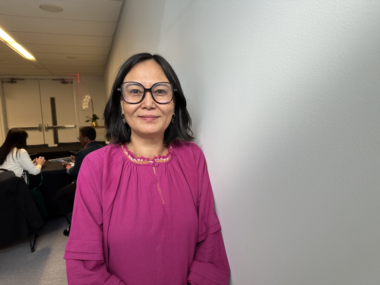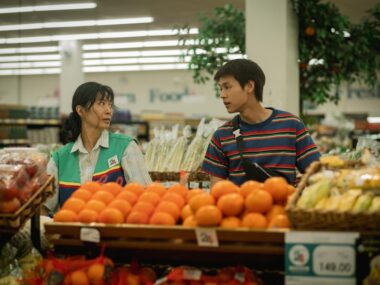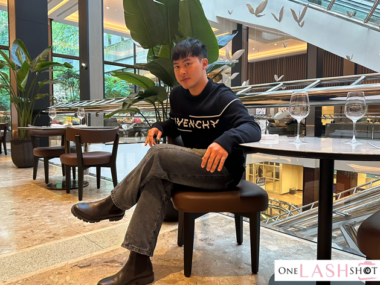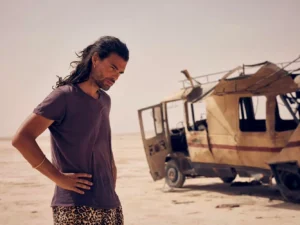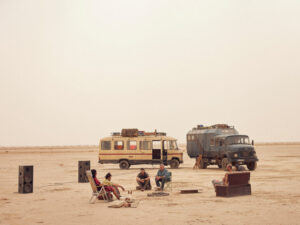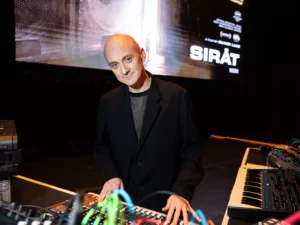Ratchapoom Boonbunchachoke is a visionary Thai filmmaker known for his distinctive blend of dark humor, political commentary, and poignant reflections on social issues. With a deep interest in exploring the complexities of human nature and historical injustices, Boonbunchachoke’s work often challenges audiences to confront uncomfortable truths while providing a unique cinematic experience. His debut feature, The Useful Ghost, garnered attention for its innovative use of supernatural elements to tackle themes of repression, historical trauma, and societal tensions in Thailand, winning the Grand Prix at the Critics’ Week section during the 2025 Cannes Film Festival and made it’s North American premiere at the Toronto International Film Festival on September 10th.
Boonbunchachoke’s approach to filmmaking is characterized by a sharp narrative style that combines surrealism with realism, creating thought-provoking and emotionally resonant stories. He often draws from Thailand’s rich cultural history, weaving in elements of folklore and myth, while also reflecting on contemporary issues such as political unrest and the fight for justice. His work is marked by a commitment to giving voice to marginalized stories and highlighting the power dynamics that shape both personal and collective identities.
The Useful Ghost is a testament to his ability to balance the eerie with the meaningful, offering a haunting exploration of history, memory, and the ghosts that linger long after the past has passed. After an employee dies at a family-run appliance factory, strange occurrences begin as spirits start possessing their products. Amidst an impending factory closure, March (Wisarut Himmarat), the owner’s son, finds solace in the form of his deceased wife Nat (Davika Hoorne), who now inhabits a vacuum cleaner. Nat, reshaping the idea of ghosts, decides to help by eliminating the “useless” spirits. Meanwhile, a repairman (Wanlop Rungkumjud) arrives at the home of a self-declared “Academic Ladyboy” (Wisarut Homhuan) to fix another haunted vacuum.
One Lash Shot had the opportunity to speak with the innovative, history-driven Thai director Ratchapoom Boonbunchachoke about his debut feature film, The Useful Ghost.

What inspired the central metaphor of a ghost inhabiting a vacuum cleaner?
The metaphor—I like the idea of how, when you talk about the metaphor, ghosts can be seen as something or someone who is not fully human, almost subhuman. It’s similar to how ghosts are portrayed in some films, where they resemble humans but aren’t entirely human. For me, ghosts could represent people who aren’t treated fully as humans. The idea of ghosts possessing electrical appliances, on the other hand, feels like a depiction of humans being reduced to mere objects—just instruments whose primary function is to serve a specific purpose, rather than existing fully as human beings.

How did you strike a balance between dark humor and political commentary in the film, especially since you tackled both themes?
For me, it just comes naturally. I’ve always enjoyed telling stories with some humor. Any story I tell tends to mix in humor, whether I intend it or not. There’s always something humorous that suddenly pops up in my mind. I’m not sure if I mix or balance it well, but it is what it is. It’s just how I develop a story. I also intentionally mix things, because I enjoy combining elements. I like blending something serious with something silly, something high with something low. In the film, you can see I pay a lot of attention to composition and how we craft each shot. I love when a film is visually well-composed, but at the same time, I like having something silly or perverse lurking underneath—like monks saying the C-word or some absurd situations playing out in the film.
At one point, I also like to dismantle the idea of what makes a ‘good’ film—the kind of award-winning, decent films that people often praise. I try to broaden that definition, because for me, a good film can be many things. Film can come in any shape or form. Even in the silliest form, it can still address serious issues. For example, when films tackle silly topics but present them in a very dramatic, ‘serious’ way, I find it uninteresting. I enjoy the contrast and the unexpected—like when a film that’s silly turns out to be something profound. I love when audiences say things like, ‘Who would have thought that a film about a haunted vacuum cleaner could turn into something about an oppressive regime?’ It’s that kind of surprise and depth that I enjoy.
What made you choose Davika Mai as the lead for this role specifically?
It’s not like I picked her—it was more of a happy accident, a coincidence. To be honest, I never imagined her being in the film because in Thailand she’s a very famous, top-tier actress. I had no one in mind for the role. I just wanted to finish the script first, without thinking about casting anyone. But then my producer, who had worked with her on another project—a Netflix series called 6ixtynin9 (I’m not sure about the English title, but it’s a remake of a film by Pen Ek Ratanaruang)—suggested her. He had worked on that series, which was a remake of Pen Ek’s 2000 film, and turned into a long-form series two years ago. Davika was the lead in that series, and my producer also produced it, so they met on set.

Davika mentioned she hadn’t worked on a film for eight or nine years—she’d been doing a lot of TV. But she was really open to shooting a film again, as long as it was an interesting project. So my producer said, ‘Why don’t you consider this? It’s about a haunted walking vacuum cleaner.’ And she said, ‘That’s exactly what I’m looking for. I want to be in that.’ I think for her, she’d already done all the commercial, mainstream work that any top Thai actress would typically do. So her next step, her next uncharted territory, would be something like this kind of independent film. And I think that really excites her.
The film also addresses historical injustice and suppression. Were there specific historical moments or events that most influenced that narrative?
Yeah, I think most of the reviews I’ve seen mention 1976, right? Massacre in Thammasat. But the one that influenced me the most was the attempt to remove or destroy the architecture of the People’s Party in 1930, which is very local and not widely known outside of Thailand.
If you remember the first scene, where the opening credits show a statue or basilisk—that’s actually the Democracy Monument in Bangkok. It was built after the 1932 revolution by the People’s Party, which was made up of young bureaucrats. At the time, Thailand was an absolute monarchy, and these young people wanted to transform the country into a constitutional monarchy. They set up a parliament, held elections, and toppled the absolute monarchy, establishing a constitutional one instead. The monument was built in the heart of Bangkok to commemorate that shift. Around the monument, there are bas-reliefs depicting the new society, with lots of people engaged in various activities. But the government didn’t last long. It only lasted about 20 years because Thailand was pulled into World War II. After that, the loyalists fought back and reclaimed power.
In recent years, there’s been an attempt to destroy buildings that were built during that era, to remove any trace of them. It’s an intentional effort to erase their legacy. So the film is about how those in power try to erase others. But I also think what’s equally important is how ideas get erased—ideas tied to those people. The People’s Party fought for a new society back then, but their legacy, the physical legacy of buildings, statues, and other structures built in Bangkok and across the country, has been slowly demolished, destroyed, or replaced with something else. Sometimes the buildings are still standing, but they change the names, essentially trying to erase the people behind it all. The idea of ghosts can be symbolic in many ways—memory, trauma, the voices of the past.
What specific dimensions of the ghost were most important to you when making this film?
I think there are two dimensions that are important to me. One, as I mentioned earlier, is the idea of a ghost as something subhuman—something that looks human but is not fully human. The other is the idea of a ghost as a representation of people from the past, as it’s said in the film: a ghost is someone who refuses to be gone. They’re dead, but they return, protesting against death. So I see ghosts as the past that failed to become the present for some reason. They couldn’t fully become part of the present, but they try, they resist, they persist, so they remain here. So, apart from being subhuman, ghosts are also the parts of us that want to be heard, want to be seen, and still want to speak—to have a conversation with the living.

And do you believe in ghosts in real life?
Honestly, I don’t have any sense of ghosts. I mean, I’ve never experienced one at all, and I thank God for that. During the shooting, there were some locations where my crew encountered ghosts, but I didn’t, and I’m glad for that. So, I don’t really believe in ghosts as terrifying entities that you can actually see. But I do believe in ghosts as a figure, mostly for artistic or political reasons.
But do you believe in the presence of it? Its existence?
Yes, they do linger sometimes. Do you believe that? I’m not sure if they’re actually ghosts or not, but I believe in this lingering energy from the past that can still be felt in the present. I’m just not sure whether that energy has any agency or consciousness—like the kind of ghost we usually imagine.
What was the biggest challenge you faced while filming this film?
I think the real challenge, if not in the filming itself, was during the financing stage. It was incredibly difficult to find the money for this film, and the project felt like it could collapse at any moment, even when we did have the funding. It was tough because, since I had never made a feature before, there were questions about my credibility—whether I could actually pull off a feature film. On top of that, the story itself, the premise, is quite unusual, even a little crazy. A lot of people asked, ‘How did you pitch this to investors or get people to give you money?’ For me, the most torturous part of making the film was securing financing. But the shooting itself went quite smoothly. It was as hard as it needed to be, but not harder than necessary. I really want to thank my team for arranging everything—they made the shooting process much smoother than I expected.
If you had to give the theme of the movie, but in one word, what would it be?
If I had to sum up the theme of the movie in one word, I’d say ‘remember’… or ‘remembrance.’ Yeah, remembrance.
Has Thailand already seen the film?
Yeah. It was released, I think, three weeks ago.
How did the audience react to the film, considering the sensitive nature of the events referenced?
I was surprised that most of the people who watched the film were very positive about it. I honestly expected they might hate it. But most of the reviews and feedback I read were very positive, with people really appreciating how political issues were depicted on screen. In Thailand, we’re considered a third-world country, so it’s rare for films to openly address politics this much.

I’d say my film is quite politically explicit, more so than many Thai films in recent years—unusually explicit, in fact. Normally, the reactions were positive, but they were very different from Western audiences. Western viewers were more focused on how capitalism reduces humans to mere objects, with key terms like “capitalism” coming up in their reviews. But in Thailand, the focus was more on themes like authoritarianism, fascism, and how the state censors and suppresses people. Thai audiences were especially struck by how the film depicted these events so explicitly, without hiding behind symbolism. I think Thai audiences have an image of arthouse films as being full of symbolism, often so obscure and inscrutable that they’re hard to understand. So they were surprised that this film was actually quite easy to follow.
What’s next for you?
I’m developing something in my head, but I haven’t had the time to write it down yet.
TV or film?
Both, actually. I have a second feature in mind, and I hope it can be made. It’s an adventure film.
[Author’s Note: ขอบคุณที่ทำให้ภาพยนตร์เรื่องนี้มีชีวิตขึ้นมา ฉันชอบอารมณ์ขันตอนที่ดูครั้งแรก แต่ผ่านการสนทนาของเรา ฉันได้เข้าใจถึงความสำคัญทางประวัติศาสตร์และแง่มุมทางการเมืองจริงๆ คอยติดตามภาคสองนะ!]
